The UN General Assembly on Tuesday has elected 15 new countries to serve on the Human Rights Council, with Peru and Russia failing to secure a seat.
Four of the 15 new members are from African countries, viz, Burundi, Côte d’Ivoire, Ghana and Malawi.
After the ballots were cast and counted, Assembly President Dennis Francis announced Albania, Brazil, Bulgaria, Burundi, China, Côte d’Ivoire, Cuba, Dominican Republic, France, Ghana, Indonesia, Japan, Kuwait, Malawi, and the Netherlands were elected to serve for three years, beginning January 1, 2024.
China, Côte d’Ivoire, Cuba, France, and Malawi were reelected for their second terms.
The Human Rights Council, the UN’s premier rights body, is responsible for upholding and advancing fundamental freedoms globally. It was created in 2006 and consists of 47 member States, elected via secret ballot by the majority of General Assembly members.
Malawi topped the voting for African nations, with 182 votes, followed by Côte d’Ivoire (181), Ghana (179), Burundi (168), and Nigeria (3). In Asia and the Pacific, Indonesia secured 186 votes, followed by Kuwait (183), Japan (175) and China (154).
In Eastern Europe, Bulgaria received 160 votes, followed by Albania (123) and Russia (83). Russia sought re-election to the Human Rights Council after it resigned on April 7, 2022.
Latin America and the Caribbean saw Cuba secure 146 votes, followed by Brazil (144), the Dominican Republic (137) and Peru (108). This is the first time the Dominican Republic has been elected to the Human Rights Council.
In Western Europe and others, the Netherlands received 169 votes, and France 153.
The new members will join Algeria, Argentina, Bangladesh, Belgium, Benin, Cameroon, Chile, Costa Rica, Eritrea, Finland, Gambia, Georgia, Germany, Honduras, India, Kazakhstan, Kyrgyzstan, Lithuania and Luxembourg in 2024.
Other members are Malaysia, Maldives, Montenegro, Morocco, Paraguay, Qatar, Romania, Somalia, South Africa, Sudan, the United Arab Emirates, the United States of America, and Vietnam.












